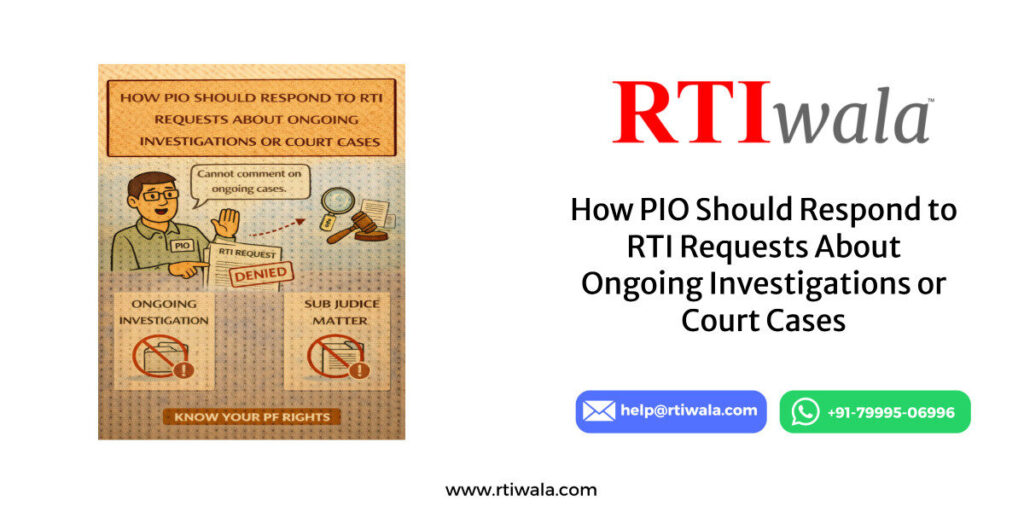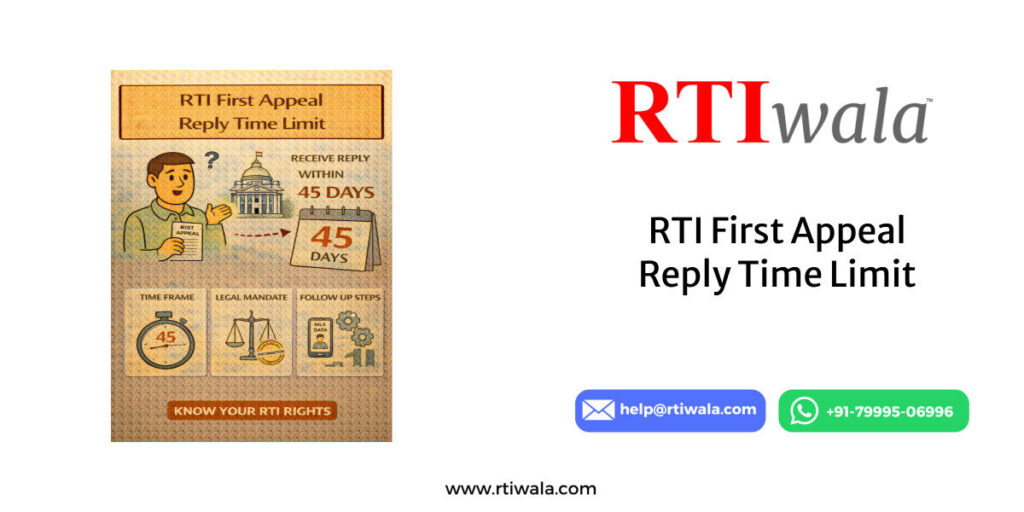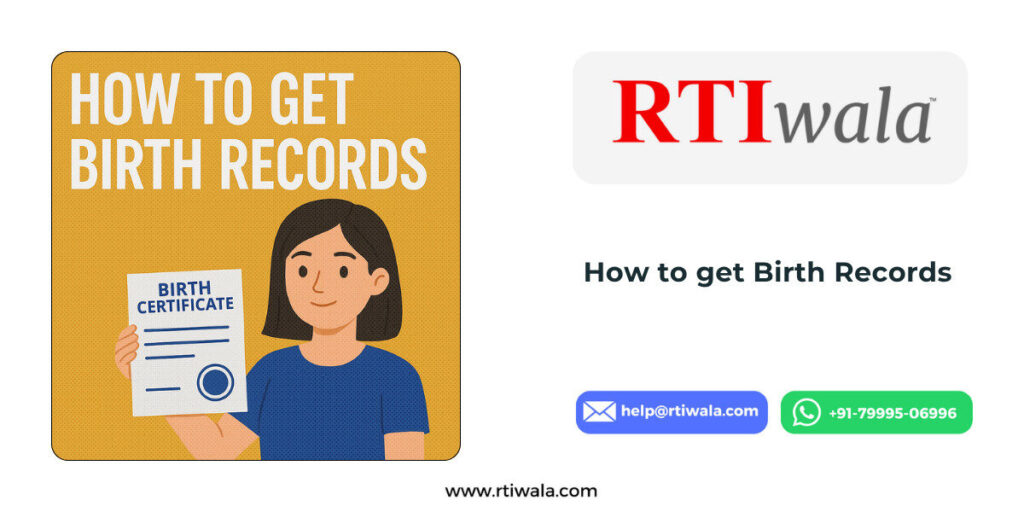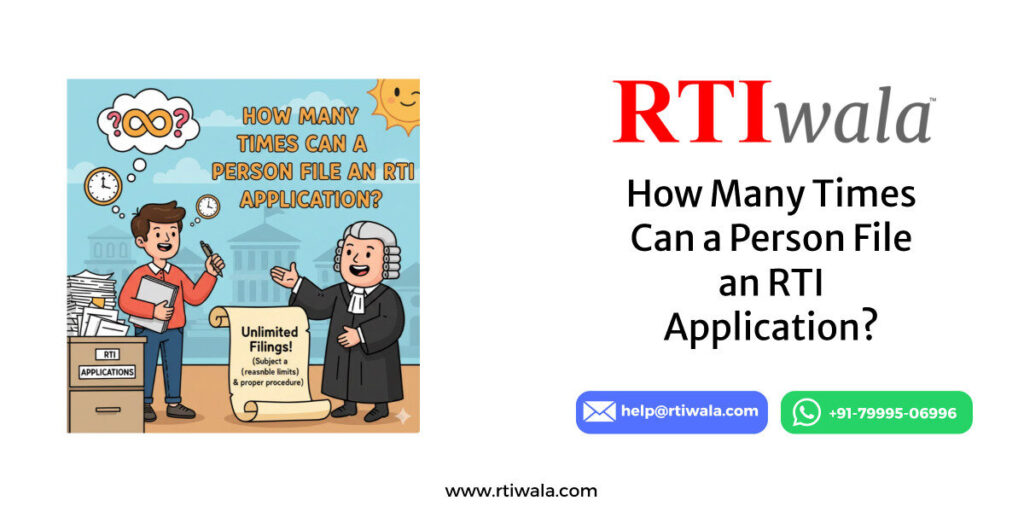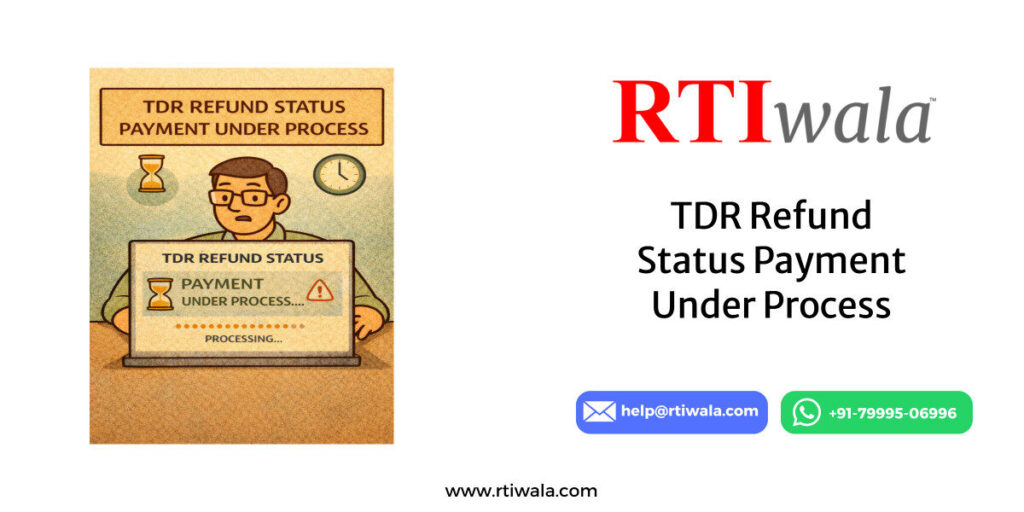Introduction
The Right to Information (RTI) Act, 2005, allows students to access their university exam answer sheets and seek clarity on marking discrepancies. If you suspect unfair evaluation, incorrect marks, or missing answers, you have the legal right to request a copy of your answer sheet and evaluation details through RTI.
This guide explains how to file RTI online for university exam paper access, including the steps, required documents, fees, and appeal process.
When Should You File RTI for University Exams Paper Access?
Unfair marking or incorrect total marks
Missing answers or unchecked responses
Re-evaluation results not provided
Delayed or incorrect result declaration
University refuses to share answer sheets
Exam rules and criteria for evaluation
How to File RTI Online for University Exam Paper Access?
Step 1: Identify the Correct RTI Authority
Before filing, determine where your university falls under:
- Central Universities (DU, JNU, BHU, AMU, IGNOU, etc.) → File via the Central Government RTI Portal: rtionline.gov.in
- State Universities (Mumbai University, Osmania University, Calcutta University, etc.) → File through the State Government’s RTI Portal or send it directly to the University’s Registrar/PIO.
- Private or Deemed Universities → If the university receives government funding or is affiliated with UGC, AICTE, or the State Education Department, file RTI through those authorities.
Step 2: Visit the RTI Online Portal
- For Central Govt. Universities → https://rtionline.gov.in/
- For State Universities → Visit the respective State RTI Portal or university website.
Step 3: Draft Your RTI Application
Sample RTI Application for Exam Paper Access:
To,
The Public Information Officer (PIO),
[University Name],
[University Address]
Subject: Request for University Exam Answer Sheet & Evaluation Details Under RTI Act, 2005
Respected Sir/Madam,
I appeared for the **[Course Name] Semester/Annual Exam [Exam Year]**, held in **[Month]**, and my Roll Number is **[Your Roll No.]**. I request the following information under the RTI Act, 2005:
1. **Certified copy of my answer sheet for [Subject Name & Paper Code].**
2. **Breakdown of marks awarded for each question and total calculations.**
3. **Evaluation criteria used for this exam.**
4. **Details of the examiner who evaluated my paper (if permissible).**
5. **Clarification regarding re-evaluation process (if requested previously).**
I have paid the prescribed RTI fee of **₹10** via **[Online Payment/Postal Order/DD]**. Kindly provide the requested information at the earliest.
Yours sincerely,
[Your Name]
[Your Contact Details]
[Your Postal Address]
Step 4: Pay the RTI Fee
Online Payment (Debit Card, Net Banking, UPI)
Indian Postal Order (IPO)
Demand Draft (DD)
Additional Fees:
- ₹2 per page for photocopies of answer sheets.
- Actual cost for postal delivery if requesting a physical copy.
Step 5: Submit & Track Your RTI Request
🔹 Submit RTI Online via https://rtionline.gov.in/ or via registered post to the university’s RTI office.
🔹 Track RTI Status: Visit RTI Online Status and enter your RTI reference number.
🔹 Response Time: Authorities must respond within 30 days.
What If the University Refuses to Provide Answer Sheets?
Facing a situation where your university denies access to your exam answer sheets under the Right to Information (RTI) Act? Don’t worry—there are clear, actionable steps you can take to resolve this issue and assert your rights. This section provides a detailed, fact-based guide to help you navigate refusals, understand legal options, and choose the best approach to secure your answer sheets. We’ll also explore the challenges of filing an RTI yourself versus the benefits of using a professional service like RTIwala to maximize your chances of success.
Steps to Take If Your RTI Request Is Ignored or Rejected
If the university fails to respond to your RTI request within 30 days or outright rejects it, you have several avenues to escalate the matter:
File a First Appeal
- What to Do: Submit a First Appeal to the First Appellate Authority (FAA) of the university within 30 days of receiving a rejection or after the university’s response deadline lapses.
- Why It Matters: The FAA, a senior university official, is legally obligated to review the Public Information Officer’s (PIO) decision for errors or non-compliance with the RTI Act, 2005.
- How to Proceed: Draft a concise appeal citing Section 19(1) of the RTI Act, include your original RTI application, and highlight the lack of response or unjust rejection.
- Pro Tip: Ensure your appeal is filed within the 30-day window, as delays can weaken your case.
File a Second Appeal
- What to Do: If the FAA dismisses your appeal or fails to respond within 45 days, escalate the matter to the State Information Commission (SIC) or Central Information Commission (CIC), depending on whether the university is state or centrally funded.
- Why It Matters: The SIC/CIC has the authority to enforce compliance, impose penalties on non-compliant PIOs, and order the release of answer sheets under Section 19(3) of the RTI Act.
- How to Proceed: File the second appeal within 90 days of the FAA’s decision, providing all relevant documents, including the original RTI, first appeal, and any university correspondence.
- Pro Tip: Clearly state how the university violated RTI provisions to strengthen your case.
Seek Legal Action
- What to Do: If the SIC/CIC fails to resolve the issue or the university persists in denying access, you can approach a High Court or the Supreme Court via a writ petition.
- Why It Matters: The Supreme Court’s landmark ruling in CBSE vs. Aditya Bandopadhyay (2011) explicitly states that answer sheets are “information” under Section 2(f) of the RTI Act, and students have a legal right to access them.
- How to Proceed: Consult a legal expert to draft a petition citing the Supreme Court precedent and any evidence of non-compliance by the university.
- Pro Tip: Legal action is a last resort but can be effective if supported by strong documentation and judicial precedents.
Supreme Court Ruling on Exam Answer Sheets
The Supreme Court’s decision in CBSE vs. Aditya Bandopadhyay (2011) is a cornerstone for students seeking access to their answer sheets. The court ruled that:
- Answer sheets constitute “information” under the RTI Act, and students are entitled to obtain certified copies.
- Universities and examination boards cannot deny access unless the request falls under specific exemptions (e.g., Section 8 of the RTI Act).
- This ruling applies to all educational institutions, public or private, conducting examinations under statutory authority.
This precedent empowers students to challenge refusals and ensures transparency in the evaluation process. If your university cites confidentiality or administrative burden, refer to this ruling to assert your rights.
Challenges of Filing an RTI Yourself
Filing an RTI application on your own may seem cost-effective, but it comes with significant hurdles that can jeopardize your chances of success:
- Complex Drafting: RTI applications require precise language and specific references to legal provisions. A poorly drafted RTI can be rejected on technical grounds.
- Lack of Follow-Up Knowledge: Many students are unaware of appeal processes or timelines, leading to missed deadlines and abandoned cases.
- Navigating Bureaucracy: Universities may exploit loopholes, provide vague responses, or delay replies, leaving self-filers frustrated and uninformed about next steps.
- Legal Jargon: Understanding exemptions under Section 8 or countering university objections requires familiarity with RTI law, which can be daunting for first-time filers.
- Time and Effort: Researching the correct PIO, drafting appeals, and tracking responses can be time-consuming, especially for students juggling academics or jobs.
These challenges often result in incomplete or unsuccessful RTI requests, leaving students without access to their answer sheets.
Why Choose RTIwala for Filing Your RTI?
Partnering with a professional service like RTIwala simplifies the process and significantly boosts your chances of success. Here’s how RTIwala addresses the cons of self-filing and delivers value:
- Expert Drafting by Legal Professionals: RTIwala’s team of legal experts crafts precise, legally sound RTI applications tailored to your specific case, ensuring compliance with RTI Act provisions.
- Higher Success Rate: Professionally drafted RTIs reduce the risk of technical rejections and address potential university objections upfront, increasing the likelihood of securing your answer sheets.
- Comprehensive Support: RTIwala guides you through the entire process, from filing the initial RTI to drafting appeals and escalating to the SIC/CIC if needed.
- Time-Saving Convenience: With RTIwala, you avoid the hassle of researching PIO details, drafting documents, or tracking responses, freeing you to focus on your studies or other priorities.
- Strategic Advice: RTIwala’s experts analyze university responses and recommend the best course of action, whether it’s filing an appeal or pursuing legal recourse, ensuring no step is missed.
- Affordable and Transparent: RTIwala offers cost-effective services with clear pricing, making professional RTI filing accessible to students. Visit RTIwala to learn more about their services.
By leveraging RTIwala’s expertise, you gain peace of mind knowing your RTI is handled by professionals who understand the nuances of the RTI Act and the education system.
Why This Matters to You
Accessing your answer sheets is not just about curiosity—it’s about ensuring fair evaluation, identifying marking errors, and protecting your academic future. Whether you’re challenging a low grade or seeking transparency, the RTI Act and the Supreme Court’s ruling empower you to demand accountability. However, navigating this process requires precision, persistence, and knowledge of legal rights—qualities that RTIwala brings to the table.
If your university is stonewalling your RTI request, don’t give up. Follow the steps outlined above, and consider partnering with RTIwala to streamline the process and maximize your chances of success. For personalized assistance, visit RTIwala’s website or contact their team for expert guidance. Take control of your rights today!
Universities Covered Under RTI Act in India
Under the Right to Information (RTI) Act, 2005, students can file an RTI to access their exam papers, mark sheets, revaluation details, or admission records from universities that fall under government or public funding.
Here’s a list of top Indian universities and institutes covered under RTI:
Central Universities
- University of Delhi (DU)
- Jawaharlal Nehru University (JNU)
- Banaras Hindu University (BHU)
- Aligarh Muslim University (AMU)
- Jamia Millia Islamia (JMI)
- Indira Gandhi National Open University (IGNOU)
- Visva Bharati University
- Central University of Hyderabad (HCU)
- Pondicherry University
- North Eastern Hill University (NEHU)
State Universities
- University of Mumbai
- University of Calcutta
- University of Madras
- Savitribai Phule Pune University
- Osmania University (Hyderabad)
- Guru Nanak Dev University (Amritsar)
- Andhra University (Visakhapatnam)
- University of Rajasthan (Jaipur)
- Lucknow University
- Patna University
Technical & Engineering Institutes
- Indian Institute of Technology (IIT Bombay)
- Indian Institute of Technology (IIT Delhi)
- Indian Institute of Technology (IIT Madras)
- Indian Institute of Technology (IIT Kanpur)
- Indian Institute of Technology (IIT Kharagpur)
- National Institute of Technology (NIT Trichy)
- National Institute of Technology (NIT Surathkal)
- Indian Institute of Information Technology (IIIT Allahabad)
- Indian Institute of Management (IIM Ahmedabad)
- Indian Institute of Management (IIM Bangalore)
Law, Medical & Other Institutions
RTI also applies to other government-funded or semi-autonomous bodies such as:
- All India Institute of Medical Sciences (AIIMS, New Delhi & regional branches)
- Postgraduate Institute of Medical Education & Research (PGIMER, Chandigarh)
- National Law Universities (NLUs)
- Indian Statistical Institute (ISI)
⚠️ What About Private Universities?
RTI is not directly applicable to private universities.
However, if they receive funding or grants from government bodies like UGC, AICTE, or state governments, you can still file an RTI via these regulatory authorities to seek information related to their functioning, admissions, or exam processes.
Common RTI Queries for University Exam Discrepancies
| RTI Query | Where to File RTI? |
|---|---|
| Get a copy of answer sheet | University Registrar / PIO |
| Discrepancy in marks | University Exam Controller |
| Breakdown of marks | University Exam Department |
| Re-evaluation process details | University RTI Officer |
| Delayed results | University Administration |
| Pending degree or mark sheet | Examination Department |
How RTI Helps in Exam Score Discrepancies?
Ensures Transparency in Marking Process
Detects Errors in Answer Sheet Evaluation
Prevents Unfair Deduction of Marks
Helps Challenge Wrong Re-Evaluation Results
How RTIwala Can Help?
Facing issues in obtaining your university answer sheet or exam scores? RTIwala provides:
Custom RTI Drafting for University Answer Sheets
RTI Filing Assistance for Exam Evaluation Issues
Tracking & Follow-Up on RTI Applications
Appeals Against RTI Denial by Universities
RTIwala Service Promotion
Make your university exam score verification easier with RTIwala expert RTI filing services:
- Expert Consultation: Get legal advice on RTI for university exams.
- Online RTI: File RTI for answer sheet access & score discrepancies.
- Anonymous RTI: Maintain privacy while requesting evaluation details.
- Custom Drafting: Professionally drafted RTI applications for universities.













































